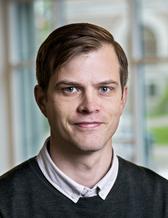- Home
- Research
- Find research
- Markus Johansson, researcher
Markus Johansson, researcher
Markus is a researcher in political science. His research interests include European integration, EU politics, EU institutions, the Council of the European Union, and collective bargaining. He teaches at all levels within the subject area of European Studies.
What are you currently researching?

I am studying European integration and, in particular, what influences the decisions being made in EU institutions. I have focused mainly on the way that member states have cooperated and influenced the Council of Ministers in the EU, as well as the importance of leadership in EU foreign policy. Currently I am looking at how member states comply with law at the EU level.
Why is it interesting?
First of all, I think that the EU as a political system is interesting. Despite its shortcomings and contradictions, the EU has managed not only to survive, but also evolve as a cooperation. The EU is a collaborative effort made by member states, and this is precisely the reason that the interactions among its member states is of particular interest in terms of understanding how the EU works, and when and why it does not.
My interest in the Council of Ministers stems from the fact that it is the EU member states’ institution. My current research focuses on whether member states comply with the laws and regulations which they themselves have jointly decided on, and why they sometimes do not comply with these common laws. Member states' compliance with the law is absolutely central to the EU, as the EU itself cannot implement many of the decisions that have been made. If the joint decisions are not followed, then they will become meaningless, and in the long run, a lack of compliance with the law can be seen as a threat to the EU's survival as a political system.
Why did you choose to pursue political science?
I studied a technical program in high school, but actually became increasingly interested in societal issues and especially international relations. So, I applied to the master’s program in political science, but I can admit now that I didn’t really know what I was getting myself into. However, I quickly got interested in political science, in large part because I thought that the issues surrounding the EU were fascinating. My interest in political science grew when it was time to write my thesis. At that point, I thought it was quite fun, which made me want to continue as a researcher.
What do you teach?
I mainly teach various courses within European Studies, both at the bachelor's and master's levels. Most of my teaching focuses on the EU as a political system, how the institutions and decision-making processes function, but also on issues that concern democracy and representation. I am responsible for the course Modern European Integration II which is offered in the fourth semester of the bachelor's program, and for the course Environment and Energy in European Integration which is offered as an elective course in the Executive Master's Program in European Studies.
When is your job most enjoyable?
I think that research is a bit of a rollercoaster, sometimes with extremely hopeful highs and really devastating lows. So, that makes it difficult to pinpoint what is most enjoyable. Right now, I very much appreciate the part of the research process that is about developing research ideas and determining what specific scientific areas in my own research are the most interesting. This applies to both my own project ideas, but also ideas that are developed by students from the various courses I’m teaching, and in those student theses that I am supervising.
In addition, I think there is a great deal of satisfaction in solving the problems that constantly arise in the research process, in finding theories and arguments to handle weak points or undeveloped parts of a text. There can be some real Eureka moments! Then, of course, it is also fun to see if the empirical data actually supports the theories developed and arguments made.
What would you be if you were not a political scientist?
I probably would have found my way to another field in the social sciences, but I have always been most interested in the political dimensions. I am also interested in cultural preservation. If I had not chosen the academic path, I might have made my career working as a craftsman or artisan.